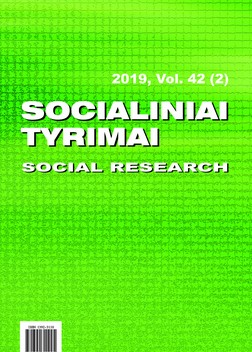Laikinojo įdarbinimo įmonės veiklos aplinkos analizė
Analysis of Temporary Employment Company Business Environment
Author(s): Erika Meškienė, Teodoras TamošiūnasSubject(s): Business Economy / Management, Labor relations, Human Resources in Economy, Labour and Social Security Law
Published by: Vilniaus Universiteto Leidykla
Keywords: temporary employment; company; internal and external factors; competitive environment;
Summary/Abstract: The relevance of the research. The emergence of temporary employment as an atypical form of work organization has become a relevant topic in the research of human resource management processes. Researchers analyze temporary employment not only as an atypical form of work organization, but also note that its practical use in labour market is characterized by flexibility while integrating workers into labour market and improving the productivity of the companies. The problem of the research. There is the lack of research and findings in scientific literature on temporary employment companies, empowering to reveal the flexibility of temporary employment management, its improvement and factors affecting it. There is little discussion among researchers about temporary employment as a flexible form of work organization, the tripartite relationship between a temporary employee, a temporary employment company and a user of temporary work. Specific and narrow issues are most often analysed. The description of the problem in this article can be summarized by the following problematic question: What are the factors that influence the management of a temporary employment company? Object of the research: factors that influence the management of a temporary employment company. Aim of the research: to disclose the factors determining the management of the activities of a temporary employment company. Research methods: Focus group, analysis of scientific literature, systematization, generalization and comparison, analysis of the contents of legal acts, statistics and other documents, methods of deduction and theoretical modelling, analysis, comparison and generalization of scientific statements and empirical research findings based on them, presentation of interpretations. Temporary employment is one of the forms of precarious employment and non-standard employment relationships. Unconventional employment patterns, in particular short-term and temporary work, have spread in many countries over the last few decades, but there is no universally accepted definition of temporary employment in scientific literature, as each country sets up their own specific regulation of employment. Temporary workers are usually considered to be workers who have concluded employment contracts for a specific period or for specific jobs, or those who have seasonal, casual or occasional work. It is widely recognized that temporary work improves the flexibility of labour market, has a positive economic impact, reduces unemployment and rapidly addresses temporary human resource shortages in companies. The form of temporary employment is convenient for disabled people, people with children and students for flexible integration into labour market, as it allows to take into consideration the mutual interests of the company and the temporary worker. Temporary employment services are provided by companies and agencies officially registered for these activities, which include the following functions: search and selection of employees, employee work accounting, employment contracts, etc. In Lithuania, the activities of temporary employment companies are regulated by the Labour Code of the Republic of Lithuania, and the criteria evaluation system of temporary employment companies is used to evaluate the activities of temporary employment companies. Every year, a temporary employment company has to submit a notice to the State Labour Inspectorate that it meets the established criteria.
Journal: Socialiniai tyrimai
- Issue Year: 42/2019
- Issue No: 2
- Page Range: 102-118
- Page Count: 17
- Language: Lithuanian

